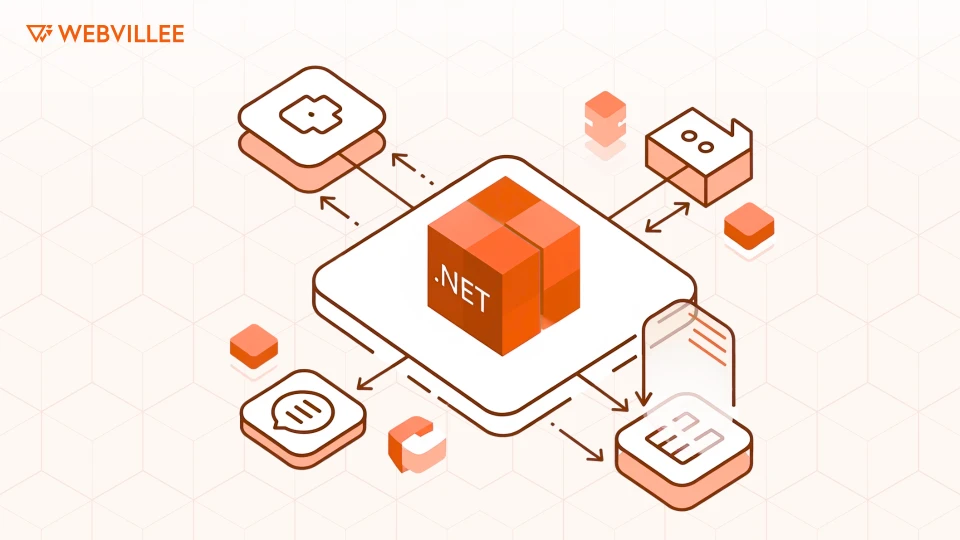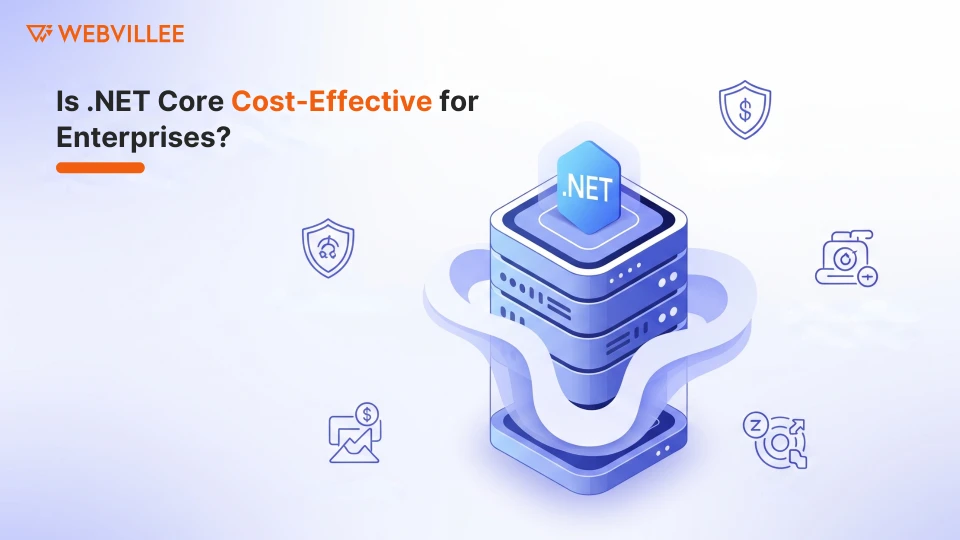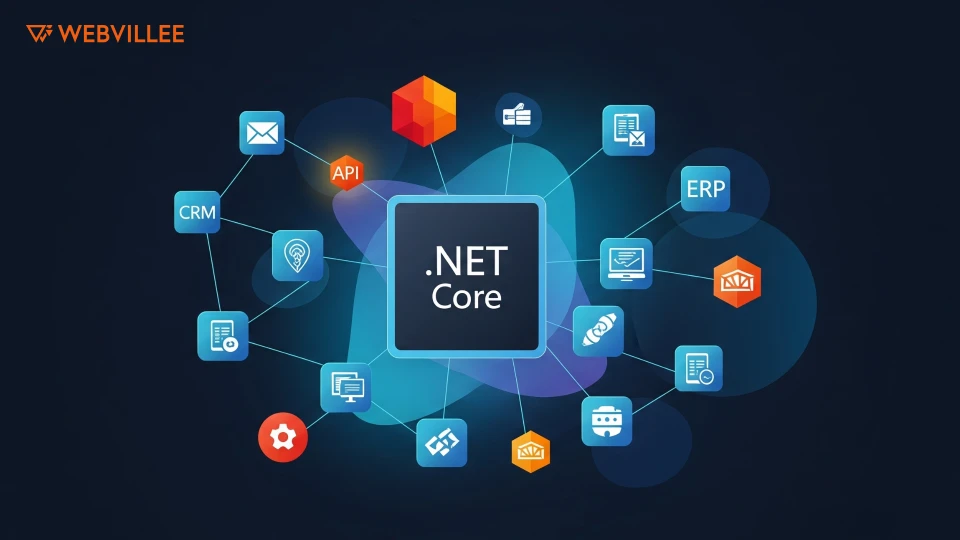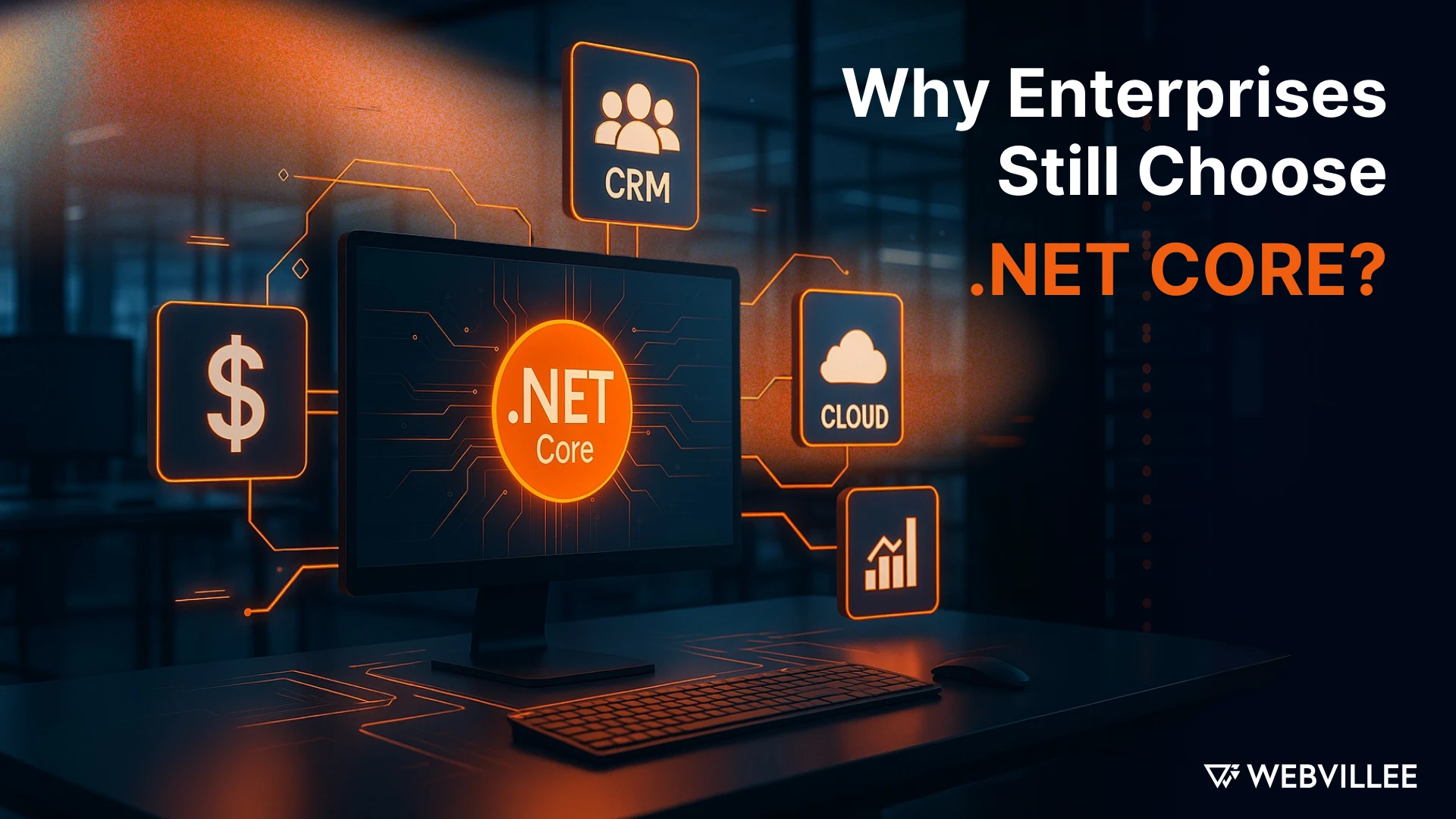Why Do Enterprises Still Choose .NET Core in 2025?
Enterprises still choose .NET Core in 2025 because it is reliable, secure, and cost-effective for building enterprise applications. .NET Core is an open-source framework created by Microsoft that allows businesses to develop applications that work across different operating systems with one codebase.
In today’s enterprise landscape, organizations face challenges such as maintaining security, reducing costs, and meeting cloud-first demands. Choosing .NET Core in 2025 gives enterprises a proven platform that balances innovation with stability. It is widely trusted by companies that need scalable, mission-critical applications.
In this blog, we will cover 10 reasons enterprises continue to adopt .NET Core, including its reliability, cross-platform compatibility, high performance, cost benefits, security features, cloud-native support, modern development practices, community ecosystem, Microsoft-backed support, and seamless integration with enterprise systems. To learn how your business can apply these advantages, Webvillee offers expertise in Dot Net Development services.
Is .NET Core Reliable for Enterprise Applications?
.NET Core is reliable because it delivers consistent performance across complex, enterprise-grade workloads. For enterprises that depend on mission-critical applications, reliability is a non-negotiable factor.
The reliable .NET Core framework has proven its ability to handle large-scale enterprise projects with minimal downtime. Many global organizations continue to trust it for building high-availability systems that run without interruption.
Key reasons for its reliability include:
- Backing from Microsoft with ongoing improvements and patches.
- Strong runtime performance with predictable behavior.
- A large ecosystem of libraries and tools to reduce development risk.
For enterprises, this means fewer failures, stronger compliance with industry standards, and smoother user experiences. By adopting .NET Core, organizations reduce the risk of operational disruptions and ensure long-term stability for their enterprise applications.

Why Is Cross-Platform Compatibility a Key Advantage?
Enterprises value .NET Core because it runs on Windows, Linux, and macOS with the same codebase. This makes it one of the most flexible frameworks available for enterprise needs.
With cross-platform .NET Core, businesses save costs by avoiding the need to build and maintain separate applications for different environments. Teams can focus on a single development cycle while ensuring compatibility across multiple systems.
Benefits include:
- Lower development and maintenance costs.
- A unified application ecosystem that works seamlessly across platforms.
- Better scalability for enterprises expanding into cloud and hybrid infrastructures.
This flexibility is a key reason why .NET Core remains a top choice for enterprises in 2025, enabling them to simplify operations and reduce complexity while maintaining efficiency.
How Does .NET Core Deliver High Performance and Scalability?
.NET Core is built for high performance and scales easily for enterprise-level demand. Enterprises that require rapid response times and scalable infrastructure find .NET Core well-suited to their needs.
With scalable .NET Core applications, organizations benefit from:
- Faster runtime that improves application responsiveness.
- Efficient memory management for resource-heavy processes.
- Smooth scalability for large-scale web and cloud-native applications.
Performance benchmarks show that it consistently outperforms many other frameworks in both speed and scalability. For decision makers, this ensures their applications can handle growing user bases and expanding workloads without performance bottlenecks.
Is .NET Core Cost-Effective for Enterprises?
.NET Core reduces costs by offering open-source flexibility and strong community support. Enterprises appreciate that it delivers quality without licensing fees, making it an economical choice for large-scale projects.
The cost benefits of .NET Core include:
- No licensing expenses since the framework is open-source.
- Access to free tools, libraries, and community contributions.
- Faster development cycles that reduce overall project costs.
By using it in enterprise projects, organizations can deliver robust applications without overspending. These savings allow businesses to allocate budgets toward innovation and expansion instead of licensing costs, making it a cost-effective solution for 2025.

How Secure Is .NET Core for Enterprise Use?
.NET Core is secure because it includes built-in security features and regular Microsoft updates. Enterprises handling sensitive data rely on frameworks that protect against evolving cyber threats.
Key .NET Core security features include:
- Enterprise-grade authentication and authorization.
- Built-in encryption and data protection capabilities.
- Regular vulnerability patches from Microsoft.
Organizations benefit from a framework that proactively addresses security challenges. This reduces the risk of breaches, ensures compliance with global regulations, and builds trust with customers who depend on safe enterprise applications.
Why Do Enterprises Value Cloud-Native Capabilities in .NET Core?
Enterprises value .NET Core because it supports cloud-native architectures, making it ideal for businesses transitioning to or expanding within the cloud.
With cloud-native .NET Core, organizations can:
- Seamlessly integrate with Azure and other cloud platforms.
- Build microservices architectures that improve flexibility and scalability.
- Deploy applications efficiently in hybrid and multi-cloud environments.
These capabilities align perfectly with enterprise goals of agility, scalability, and cost efficiency.
How Does .NET Core Support Modern Development Practices?
.NET Core aligns with modern development through microservices, DevOps, and containerization. Enterprises today prioritize flexibility, speed, and automation in software delivery.
With .NET Core for DevOps and microservices, businesses gain:
- Seamless integration with Docker and Kubernetes for containerized deployments.
- Strong support for CI/CD pipelines that automate testing and delivery.
- Ability to break down monolithic applications into agile microservices.
These practices improve collaboration across teams, reduce errors, and accelerate time-to-market.

Why Is Community and Ecosystem Support a Deciding Factor?
Enterprises trust .NET Core because it has a large developer community and an extensive ecosystem of libraries and tools. A strong community ensures that enterprises always have access to expertise and resources.
The .NET Core developer community provides:
- A wide knowledge base with tutorials, forums, and best practices.
- Contributions that continuously enhance the framework.
- Access to skilled developers worldwide.
For enterprises, this means easier hiring, faster problem-solving, and reduced dependency on limited resources.
How Does Long-Term Microsoft Support Benefit Enterprises?
Microsoft’s long-term support ensures stability and reliability for enterprise investments. Enterprises need confidence that the frameworks they choose will remain supported for years to come.
Key aspects of Microsoft support for .NET Core include:
- Extended Long-Term Support (LTS) versions that ensure stability.
- Regular updates, patches, and feature enhancements.
- A clear roadmap that aligns with enterprise planning.
For enterprises, this support translates into reduced risk, easier planning, and greater trust in their technology stack.
What Role Does Integration Play in .NET Core’s Popularity?
It integrates seamlessly with existing Microsoft tools and third-party solutions, making it a natural choice for enterprises with diverse systems. Integration is critical for building connected enterprise environments.
With .NET Core enterprise integration, businesses can:
- Connect applications with CRM, ERP, and other enterprise tools.
- Support APIs that enable third-party integrations.
- Ensure data flows smoothly across multiple platforms.
This interoperability reduces silos, improves efficiency, and ensures enterprise systems work together effectively.

Why Should Enterprises Still Invest in .NET Core in 2025? (Conclusion)
Enterprises should still invest in .NET Core because it combines reliability, performance, and cloud-readiness with Microsoft-backed stability. It remains one of the most trusted frameworks for building scalable, secure, and cost-effective applications.
The 10 reasons enterprises continue to adopt .NET Core include its reliability, cross-platform support, high performance, cost savings, security, cloud-native capabilities, modern development practices, community ecosystem, Microsoft support, and integration strengths.
For enterprises, the long-term benefits include cost efficiency, stronger compliance, and reduced risk in digital transformation. Get in touch with Webvillee for expert Development services to make the most of it.

